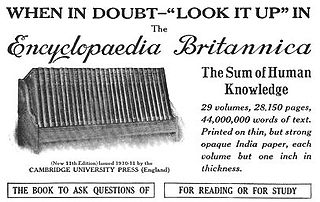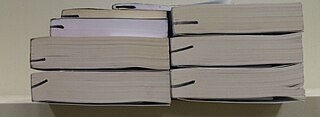Related Research Articles

Publishing is the activity of making information, literature, music, software and other content available to the public for sale or for free. Traditionally, the term refers to the distribution of printed works, such as books, newspapers, and magazines. With the advent of digital information systems, the scope has expanded to include electronic publishing such as ebooks, academic journals, micropublishing, websites, blogs, video game publishing, and the like.
A video game publisher is a company that publishes video games that have been developed either internally by the publisher or externally by a video game developer.

Print on demand (POD) is a printing technology and business process in which book copies are not printed until the company receives an order, allowing prints of single or small quantities. While other industries established the build to order business model, "print on demand" could only develop after the beginning of digital printing, because it was not economical to print single copies using traditional printing technology such as letterpress and offset printing.

An income statement or profit and loss account is one of the financial statements of a company and shows the company's revenues and expenses during a particular period.
The bibliographical definition of an edition includes all copies of a book printed “from substantially the same setting of type,” including all minor typographical variants.
Omnibus Press is the world's largest specialist publisher of music-related books. It publishes around 30 new titles a year to add to a backlist of over 250 titles currently in print.

An out-of-print book is a book that is no longer being published. The term can apply to specific editions of more popular works, which may then go in and out of print repeatedly, or to the sole printed edition of a work, which is not picked up again by any future publishers for reprint. Most works that have ever been published are out of print at any given time, while certain highly popular books, such as the Bible, are always "in print". Less popular out-of-print books are often rare and may be difficult to acquire unless scanned or electronic copies of the books are available. With the advent of book scanning, and print-on-demand technology, fewer and fewer works are now considered truly out of print.

Remaindered books or remainders are printed books that are no longer selling well, and whose remaining unsold copies are liquidated by the publisher at greatly reduced prices. While the publisher may take a net loss on the sales of these books, they are able to recover at least some of their sunken costs on the sale and clear out space in the warehouses.
Thor Power Tool Company v. Commissioner, 439 U.S. 522 (1979), was a United States Supreme Court case in which the Court upheld IRS regulations limiting how taxpayers could write down inventory.
Mills & Boon is a romance imprint of British publisher Harlequin UK Ltd. It was founded in 1908 by Gerald Rusgrove Mills and Charles Boon as a general publisher. The company moved towards escapist fiction for women in the 1930s. In 1971, the publisher was bought by the Canadian company Harlequin Enterprises, its North American distributor based in Toronto, with whom it had a long informal partnership. The two companies offer a number of imprints that between them account for almost three-quarters of the romance paperbacks published in Britain. Its print books are presently out-numbered and out-sold by the company's e-books, which allowed the publisher to double its output.
Midlist is a term in the publishing industry which refers to books which are not bestsellers but are strong enough to economically justify their publication. The vast majority of total titles published are midlist titles, though they represent a much smaller fraction of total book sales, which are dominated by bestsellers and other very popular titles.
Harlequin Enterprises Limited is a Toronto-based company that publishes series of romance and women's fiction. Harlequin was owned by the Torstar Corporation, the largest newspaper publisher in Canada, from 1981 to 2014. It was then purchased by News Corp and is now a division of HarperCollins.
Ten Speed Press is a publishing house founded in Berkeley, California in 1971 by Philip Wood. Ten Speed Press was bought by Random House in February 2009 and is now part of their Crown Publishing Group division.
Sell-through refers to the percentage of a product that is sold by a retailer after being shipped by its supplier, typically expressed as a percentage. Net sales essentially refers to the same thing, in absolute numbers. Sell-through is calculated during a period.
Wilfrid Laurier University Press, based in Waterloo, Ontario, is a publisher of scholarly writing and is part of Wilfrid Laurier University. The fourth-largest university press in Canada, WLUP publishes work in a variety of disciplines in the humanities and social sciences — literary criticism, indigenous studies, sociology, environmental studies, and history among them — as well as books of regional interest. Laurier Press also provides publishing services to scholarly associations and journals.
Red Wheel Weiser Conari, also known in different periods in its history as RedWheel/Weiser, LLC and Samuel Weiser, Inc., is a book publisher with three imprints: Red Wheel, Weiser Books and Conari Books. It is America's second-largest publisher of occult and New Age books, behind Llewellyn Worldwide, and is also one of the oldest American publishers to concentrate exclusively on that genre. It publishes on average 60-75 new titles per year and maintains a large backlist, partly of books that it originally published, and partly of older public domain rare occult books.
Self-publishing is the publication of media by its author without the involvement of an established publisher. The term usually refers to written media, such as books and magazines, either as an ebook or as a physical copy using POD technology. It may also apply to albums, pamphlets, brochures, video content, and zines.
Kindle Direct Publishing is Amazon.com's e-book self-publishing platform launched in November 2007, concurrently with the first Amazon Kindle device. Amazon launched Kindle Direct Publishing (KDP), originally called Digital Text Platform, for authors and publishers to independently publish their books directly to the Kindle Store.

Boni & Liveright is an American trade book publisher established in 1917 in New York City by Albert Boni and Horace Liveright. Over the next sixteen years the firm, which changed its name to Horace Liveright, Inc., in 1928 and then Liveright, Inc., in 1931, published over a thousand books. Before its bankruptcy in 1933 and subsequent reorganization as Liveright Publishing Corporation, Inc., it had achieved considerable notoriety for editorial acumen, brash marketing, and challenge to contemporary obscenity and censorship laws. Their logo is of a cowled monk.
A hybrid press or hybrid publisher is a publishing house that operates with a different revenue model than traditional publishing, while keeping the rest of the practices of publishing the same. The revenue source of a traditional publisher is through the sale of books that they publish, while the revenue of hybrid publishers comes from both book sales and fees charged for the execution of their publishing services. To be a hybrid publisher, a company must uphold longstanding publishing industry standards and best practices.
References
- ↑ McDowell, Edwin, "Publishing's Backbone: Older Books"; The New York Times , March 26, 1990
- 1 2 http://www.sfwa.org/2005/01/how-thor-power-hammered-publishing/
| | This publishing-related article is a stub. You can help Wikipedia by expanding it. |